Thomas James Powell
The Bermuda Police Force was created on 1st October 1879. In a lecture on the History of the Bermuda Police given by retired Chief Inspector Roger Sherratt during Police Week 2014 the following paragraph is noted.
One of the earliest full-time constables was Thomas Joseph Powell who joined the Police in 1884 following a short but remarkable career in the British Army. He served with the 11th Hussars during the Crimea War where he was awarded the Crimea War medal with 3 bars (Alma, Balaclava and Sebastopol).
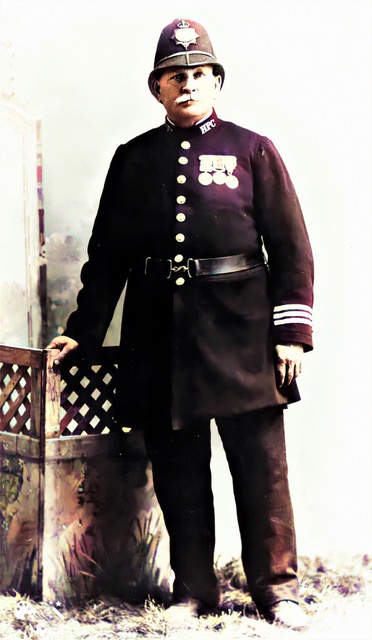
When I re-read this paragraph in early 2020 the germ of the idea for the creation of The Brave Blue Line was formed, and I wanted my first article to be about Constable Powell.
My researches which helped create The Former Members Lists 1879 -1979, (see http://www.expobermuda.com/~bermyxpo/index.php/expo-lists-2) included a Sergeant Thomas Powell who according to ‘Coops List’ served from 1st January 1884 to 31st December 1906.
As a result Sergeant Thomas Joseph Powell was added to the List and recorded as having served from 1st January 1884 to 31st December 1906.
Later when I had access to the Blue Books (The Government Schedule of Taxes, Duties, Fees and All Other Sources of Revenue), a Constable T.J. Powell was added with service dates from about circa 1865 to circa 1866. The Books only named him as T.J. Powell.
The Blue Books after 1884 also recorded a T.J. Powell as a Constable in the Bermuda Police Force. I recorded this PC Powell as Thomas Joseph Powell. My researches into the very early years of Bermuda Police Force, especially the Bermuda National Library Digital Collection started mentioning Constable Thomas James Powell, who was serving in 1865.
Life for me was becoming confusing where T.J. Powell of the Bermuda Police Force was concerned. Then Covid started and I put researches into Constable Powell on hold and instead started researching what became ‘The Brave Blue Line - Stories of Bermuda’s Policemen who served in the Military during World War One.’
As my researches progressed, and I became more familiar with my sources and how to search them, I occasionally came across information regarding Thomas James Powell of the Bermuda Police Force.
Thomas James Powell according to ancestry.com is believed to have been born in Athlone, Ireland on 30th November 1834, but local published accounts state that he was a native of Worcestershire, England. All accounts give his date of birth as 30th November 1834. I have yet to trace his parents.
Private 1331 Thomas Powell is listed as a member of the 11th Hussars when the Hussars took part in the famous ‘Charge of the Light Brigade’ at the Battle of Balaclava on 25th October 1854. (See http://www.chargeofthelightbrigade.com/allmen/allmenP/indexallmenP.html).
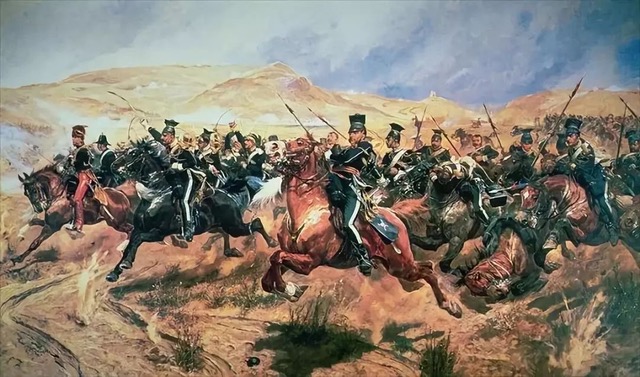 The Charge of the Light Brigade By Richard Caton Woodville, Jr. (Source Wikipedia)
The Charge of the Light Brigade By Richard Caton Woodville, Jr. (Source Wikipedia)
He also took part in the battles at Alma and Sebastopol. Thomas Powell is reputed to have left the army because of wounds that he suffered and later he became a Bandsman in the Royal Navy.
On July 16th 1858 Thomas Powell, at the age of 24 years, was initiated into Freemasonry at Royal Sussex Lodge, No. 704 of the United Grand Lodge of England in Halifax, Nova Scotia, Canada. It is also recorded that he was serving with HMS Indus. HMS Indus was on the North American and West Indian stations, which included Bermuda.
The first public indication that Thomas Powell was in Bermuda was in the Royal Gazette of 2nd September 1884.
FIRE IN THE TOWN OF HAMILTON.
Yesterday morning at about 1.50 a fire was discovered in the upper part of the premises in the occupation of Edgar Freeman Simmons, Merchant Tailor, corner of Front and Burnaby streets of the Town of Hamilton, and over the Store of D. E. Seon, Esqr., by Acting Police Constable Thomas James Powell, who was on morning duty.
It appears that Powell at a short distance from the premises, saw the glimmer of a light similar to that of a burning candle, when he immediately ran back, and on nearing the premises saw a large amount of smoke issuing through the eaves of the building, upon which he cried out “ Fire”, the smoke meanwhile becoming denser. Constables Adams and Williams rang the Trinity alarm bell and also aroused Mr. Brown, who is in charge of the hand Fire Engine, which was quickly at the scene of the fire, rendering its usual good service. The steam fire engine soon followed, and immediately took an active part in the work of saving property. The first person answering the Policeman’s cry of fire was Mr. S. Nelmes, from the Tower, and almost immediately several other neighbours arrived.
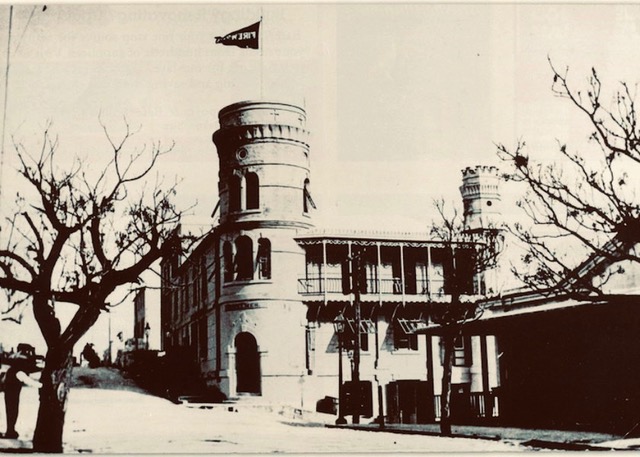 The Tower Building on Burnaby Hill owned by Mr. Samuel Nelmes
The Tower Building on Burnaby Hill owned by Mr. Samuel Nelmes The fastenings of the doors and windows in the upper and lower parts of the building with the exception of the door on the landing at the head of the stairs leading directly into that portion of the premises occupied by Mr. Simmons, had not been disturbed, but the gate at the entrance to the passageway, which is usually secured by a chain and padlock, was found unfastened.
On entering the premises those windows which were not protected with wooden shutters were found to be covered with tweeds and other goods taken from the immediate shelves, plainly showing that the persons operating within were determined on keeping all evidence of the fire from being seen from without until it had attained large proportions, and thus more successfully to carry out their fiendish plans,
How an entrance was ever effected by the person or persons committing the deed we are at a loss to conjecture. By the appearance of the doors and surroundings it looks as though a means of egress had been obtained from within by cutting away part of the half door which supported the bolt, the lock apparently not having been tampered with: but by what means the incendiary first established himself inside the premises is food for speculation.
Mr Simmons stock and fixtures were insured for £700. Not so fortunate is Mr Seon, whom, we fear, has suffered severely, the greater portion of his valuable stock being considerably damaged and on which, we understand, there is no insurance.
The Royal Gazette does not report that anyone was apprehended for this crime, despite a £200 reward being offered, but it did report that Mr Simmons was having his stock and fixtures replaced by his insurance company.
On March 8th 1892 Constable Thomas James Powell joined Atlantic Phoenix Lodge No. 224, in Hamilton, Bermuda under the United Grand Lodge of England.
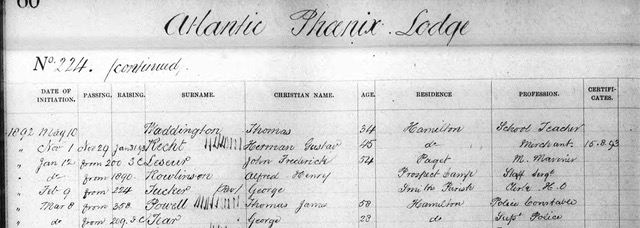 Excerpt from United Grand Lodge of England records (Source ancestry.com)
Excerpt from United Grand Lodge of England records (Source ancestry.com)
A close examination of the above excerpt will reveal that Superintendent of Police George Tear joined the Lodge on the same date.
At times the lot of a Policeman can be quite dangerous as noted in the Royal Gazette of 31st May 1892.
POLICE COURT, HAMILTON.
Worshipful M.A.M. Frith, J.P., Police Magistrate
“A woman named Margaret Miller was arrested on Saturday evening by Constable Powell for attempting to shoot Jane Hooper with a revolver. The women had some dispute about family affairs and not being able to settle their difficulties, Margaret had recourse to a borrowed revolver. According to the account of Jane Hooper, Margaret stood at arms length when she fired, but her aim was very bad. The case was brought before the police magistrate yesterday and remanded until tomorrow for further evidence.
Constable Powell’s lot as a policeman became a little happier the following year according to the Royal Gazette of 7thJuly:
MARRIED - At the residence of Mr. F.E. Tite in this town on the 2nd instant, by the Revd. Andrew Burrows, D.D., Thomas James Powell to Sarah Jane Armstrong, late Army Schoolmistress, 1st Leicestershire Regt.
This union eventually produced a great grand son, Joell Cassidy, who became a member of the Bermuda Reserve Police, and whom I thank for his help in the researches for this article.
And then on 2nd June 1902 the Royal Gazette reported on the reorganisation of the Bermuda Police Force and Constable Powell received a promotion.
The New Police Force
The Police Establishment Act, 1901, came into force on 1st inst. Under this Act the Police Force of these Islands is ordinarily to consist of an Inspector of Police, three Chief Police Constables, fifteen Police Constables and twenty-one Rural Police Constables all of whom are to be appointed by the Governor.
On 1st June 1902 Thomas James Powell was appointed Chief Police Constable for the Police District of Hamilton.
The following year on 4th July 1903 the Royal Gazette reported that Thomas James Powell was to retire.
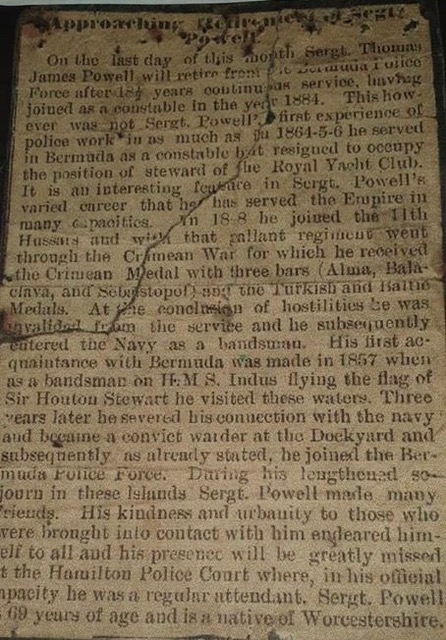
Approaching Retirement of Sergt. Powell.
On the last day of this month Sergt. Thomas James Powell will retire from the Bermuda Police Force after 18½ years continuous service, having joined as a constable in the year 1884. This however was not Sergt. Powell's first experience of police work in as much as in 1864-5-6 he served in Bermuda as a constable but resigned to occupy the position of steward of the Royal Yacht Club.
It is an interesting feature in Sergt. Powell's varied career, that he has served the Empire in many capacities. In 1848 he joined the 11th Hussars and with that gallant regiment went through the Crimean War for which he received the Crimean Medal with three bars (Alma, Balaclava, and Sebastopol) and the Turkish and Baltic Medals. At the conclusion of hostilities he was invalided from the service and he subsequently entered the Navy as a Bandsman. His first acquaintance with Bermuda was made in 1857 when as a bandsman on H.M.S. Indus flying the flag of Sir Houton Stewart, he visited these waters.
Three years later he severed his connection with the navy and became a Convict Warder at the Dockyard and subsequently, as already stated, he joined the Bermuda Police Force. During his lengthened sojourn in these Islands Sergt. Powell made many friends. His kindness and urbanity to those who were brought into contact with him endeared himself to all and his presence will be greatly missed at the Hamilton Police Court where, in his official capacity he was a regular attendant. Sergt. Powell is 69 years of age and is a native of Worcestershire.
On 1st August the following short notice was published.
Sergt. Powell severed his connection with the Bermuda Police Force yesterday and the vacancy caused by his retirement is filled by Sergt. Robinson of St. Georges.
Thomas James Powell was only able to enjoy a few years of retirement as his death was reported on 10th October 1911.
The Late T.J. Powell.
At 10 o'clock on Saturday died Thomas J. Powell. For upwards of forty years a familiar figure in Hamilton.
As a young man he entered the Army and served in the Crimean War, having been it was alleged, present in the historic charge of the Light Brigade. He afterwards joined the Royal Navy, and took his discharge at Bermuda, where he determined to make his home.
He found employment as steward of the Royal Bermuda Yacht Club, and subsequently started in business as a baker.
Later he joined the Police Force, from which he retired on the 30th September 1903, after having served nineteen years.
Deceased was an enthusiastic Freemason, a Past Master of Atlantic Phoenix Lodge, Past Principal of the Atlantic Chapter of Royal Arch Masons and Past Preceptor of the Bermuda Preceptory of Knights Templars.
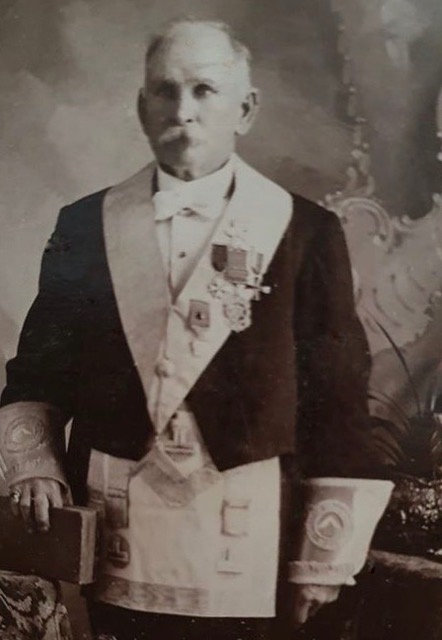 W. Bro. Thomas James Powell in Masonic regalia.
W. Bro. Thomas James Powell in Masonic regalia.
He was also a member of the Ancient Order of Foresters and of the Bermuda Mechanics' Beneficial Association.
The funeral took place on Sunday at 4.30 p.m. from the residence of Mr. F.E. Tite, Court Street, son-in-law of the deceased. The coffin was borne on a gun carriage, a detachment of the Bermuda Volunteer Rifle Corps under Captain C.S. Higgs, with band under Mr. F.W. Lines, and firing party under Sergeant Voisey, formed the military escort.
The cortège was composed of twenty men of the Bermuda Police under Inspector E. Belmore, and members of the Freemasons, Ancient Order of Foresters, and Bermuda Mechanics, all wearing regalia. Messrs. George Tear, George E. Winter, F. Gibson Ward. Herbert F. Wilton, Alfred Hatcher, and Charles H. Leseur bore the pall. A large number of people followed.
On the way to the Pembroke Cemetery the band played the “Dead March in Saul.”
The Funeral Service was conducted by the Venerable Archdeacon Davidson. When the service was concluded, the firing party delivered three volleys over the grave and “The Last Post" was sounded by the bugles.
Deceased was born on the 30th November 1834 and had consequently almost completed his 77th year.
Some forty years later Thomas James Powell was again the subject of an article in the Royal Gazette on 21st January 1951:
Bermuda And Balaclava—Medals Are Link With “Six Hundred”
Bermuda and Balaclava are separated by almost half the world, yet there is a link between the oldest Colony of the British Empire and one of the most famous battles in history.
Snug inside a cedar box, lined with velvet, lie three medals awarded to the late Sergeant Thomas James Powell, of the 11th Hussars. One is the Crimean Medal with three bars, pinned to its yellow and white ribbon - Alma, Balaclava and Sebastopol; the second is the Baltic Medal; and the third is the Turkish Medal.
Sergeant Powell, who was the grandfather of Mrs. John Cassidy of Serpentine Road, joined the Hussars in 1846. When the Crimean War broke out he was sent overseas with his regiment to engage in the long and bitter battle with the Russians. The sergeant saw action at Alma and stormed Sebastopol which was in Russian hands.
But his “finest hour" came when he was one of the six hundred who rode “into the valley of death” at the battle of Balaclava. Lord Tennyson has immortalised the magnificent but hopeless charge of the Light Brigade in his famous poem. Of the six hundred Lancers and Hussars who charged the flaming mouths of the Russian guns, only a handful returned. Sergeant Powell was one of them. He lived to tell a tale few were privileged to do. Often his grand-daughter, when she was still Charlotte Isabel Powell, heard the story of the charge from her grandfather’s lips.
‘It certainly was exciting, she exclaimed as she fondled the medals gained by the ex-sergeant. I used to have a picture of the battle of Balaclava but it was so gruesome I got my husband to take it to the Armoury when it was the headquarters of the Bermuda Volunteer Rifle Corps, she continued.
The rigours of the Crimea War took their toll on Sergeant Powell. At the conclusion of hostilities he was invalided from the Army. Thomas James Powell however, had not lost his appetite for adventure. He subsequently entered the Royal Navy as bandsman. Thus he made his first acquaintance with Bermuda in 1857 when, as a bandsman on H.M.S. Indus, flying the flag of Sir Houton Stewart, he visited these waters.
Within three years he had severed his connection with the sea and settled in the Colony.
The sergeant then became convict warder at the Dockyard. During the years 1864-5-6 he served in the Bermuda Police Force but resigned to occupy the position of steward at the Royal Yacht Club. In 1884 he rejoined the Police Force as a constable and retired after 18 ½ years continuous service.
Sergeant Powell was a native of Worcestershire, England, but spent 40 of his 77 years in Bermuda. He died about 1910.
Mrs. Cassidy also has a sword which she believes her grandfather used at Balaclava. An anchor surmounted by a crown is emblazoned on the lower part of the guard.
The sword is unlikely to have been used at Balaclava as the design of an anchor surmounted by a crown is a motif often used on naval swords. As Thomas Powell was a former Convict Warder, in HM Dockyard it is likely that the sword may have issued to him there, or presented to him when he left the Dockyard service.
As for Thomas Joseph Powell, the only reference to him that I have been able to find is as a caption to a photograph. The photograph shows Constable Powell in Bermuda Police uniform wearing his Crimea medals, and as noted above, the correct caption should be Thomas James Powell.
As a result of the research for this article Thomas James Powell now has two service entries in the 1879-1979 List.